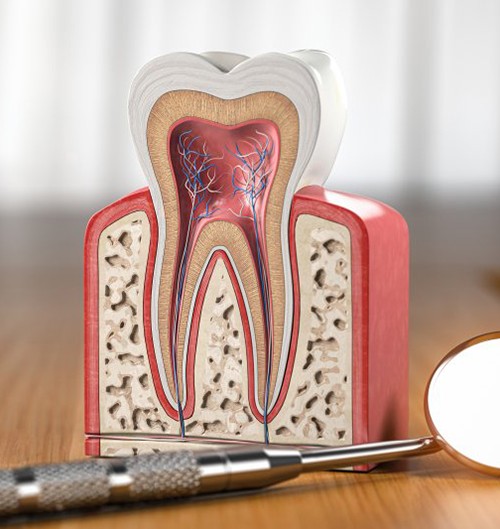Root Canal Treatment – Des Plaines, IL
Simple & Effective Treatment for Relieving Tooth Pain
If your tooth has been severely damaged or is showing signs of infection, then you’ll need to get it treated straight away. The sooner you can address the problem, the quicker you can go back to enjoying a more comfortable smile. That’s why our team at Brite Smiles is proud to offer safe and reliable root canal treatment in Des Plaines! With this procedure, we can put a stop to dental pain while also saving your natural tooth from needing to be removed. Keep reading to learn more about this treatment, or call us today if you need to schedule an emergency appointment.
Why Choose Brite Smiles for Root Canal Treatment?
- Utilizes Modern Dental Technology
- Professional & Caring Dental Team
- Welcomes Dental Insurance & Flexible Financing Available
Do You Need Root Canal Treatment?

In most cases, a tooth that has a cavity will mostly have damage on the external part of the enamel. However, if bacteria start to spread into the inner layers of the tooth, they can end up attacking the sensitive dental pulp, creating pressure and pain. Other indications of needing root canal treatment include:
- Red or swollen gums
- Dark discoloration on the tooth
- Prolonged sensitivity to cold and hot foods and drinks
- Pain when biting or chewing
- A pimple-like bump on the gums
Notify our team if you notice any of the above symptoms or any other abnormal signs, so that we can schedule you for treatment.
The Root Canal Process

Getting a root canal involves extracting the damaged or dead tissue that’s creating discomfort and harming your oral health. Your dentist will first completely numb your mouth so that you don’t feel any pain during your treatment. Of course, you may experience some pressure during the process, but it will be short-lived. Our team will also use specialized tools to make a tiny hole into the top of your tooth so that we can reach the inner layers. After extracting the diseased tissue, we’ll disinfect the area and use filling material to replace the missing structure. We’ll then place a crown atop your tooth to cover and protect the results.
The Benefits of Getting a Root Canal

Although most people hear about root canals being uncomfortable, this procedure is actually designed to end tooth pain. Additionally, most patients claim that it feels similar to getting a large filling. Another advantage is that you’ll be able to preserve even a natural tooth that’s been infected. In some cases, a severely compromised tooth may need to be extracted, which could be costly due to needing to replace the missing tooth. Root canal treatment can help you avoid all of that while enjoying your natural smile again.
Understanding the Cost of Root Canals

If you have a severely damaged or decayed tooth causing pain or interfering with daily tasks, like eating and speaking, the last thing you want to worry about is whether you can afford to fix it. Many patients want to know the anticipated cost for their root canal before their appointment, but the total due depends significantly on your unique circumstances.
Continue reading to learn more about how the price of your procedure is determined at Brite Smiles, and please don’t hesitate to contact us for additional information!
Factors That Can Affect Root Canal Cost

The rate of your root canal procedure in Des Plaines depends on your unique situation and can potentially be influenced by several factors, such as:
- The location of the troublesome tooth. Molars in the back of your mouth are harder to access and typically have more roots, increasing the final amount.
- The severity of your condition. If a specialist is required, you will be responsible for paying for their services, too.
- Other required procedures. You’ll also need to pay for any additional services, like placing a dental crown to protect and preserve your tooth after treatment.
Is it Cheaper to Pull My Tooth?

Many people feel anxious about root canals and wonder if it’s simpler and less costly to have their aching tooth extracted. However, although a removal might seem cheaper initially, there are long-term consequences for missing teeth that you might not have considered.
For instance, you could develop an infection or a painful complication known as dry socket. Furthermore, your roots stimulate your jawbone to keep it active and healthy, and it can begin to thin after pulling a problematic tooth. This can eventually contribute to additional tooth loss, which requires more complex and pricier treatments to address.
Does Dental Insurance Cover Root Canal Treatment?

Dental insurance is a simple and effective way to reduce the out-of-pocket expenses for your dental care, and it’s natural to wonder whether your root canal is included. Thankfully, most policies cover anywhere from 50% to 80% of the total cost once you’ve met your annual deductible.
However, every plan is different and there are no guarantees, so it’s worth confirming what’s included in your coverage. If you need help finding the information or with submitting paperwork or claims, please let us know! Our friendly office staff is familiar with different providers and can help you maximize your available benefits.
Other Options for Making Root Canal Treatment Affordable

We understand that not everyone carries a dental insurance plan, but we also believe that you deserve top-quality services to improve your oral health regardless of your finances. If you’re worried about affording your root canal and don’t have a policy, you might benefit from one of our flexible financial packages.
We’ve partnered with CareCredit, a third-party financer, that allows you to divide your total invoice into more manageable installments over a designated period, if your application is approved.
Root Canal FAQs
Do Root Canals Hurt?
Let’s start with one of the most popular questions: “Do root canals hurt?” Although it’s one of the most feared procedures and it has a scary reputation, eliminating the infection is virtually painless thanks to powerful numbing agents. Our Des Plaines dental team will even provide you with aftercare instructions to prevent soreness and sensitivity from surfacing during the recovery process, including rinsing with warm saltwater periodically and taking OTC pain medication as directed.
My Toothache Went Away. Do I Still Need a Root Canal?
Yes! After all, the change in symptoms is likely due to the nerve dying, which means there is only a small window of time when your tooth can still be saved. So, if your toothache goes away seemingly overnight, don’t continue to take the “wait and see” approach. Instead, schedule an emergency appointment at our office ASAP so we can provide the restorative care you need.
Is There Anything I Can’t Eat Following a Root Canal?
There are a few things you need to know about eating following a root canal. The first is that you need to wait until you’ve regained full sensation in your mouth (this will help prevent a serious soft tissue injury, like a large cut on your tongue). Second, you should avoid crunchy, acidic, and sugary foods, like hard pretzels and ice cream. Third, always check the temperature of your food beforehand since your mouth will be more sensitive.
Do Root Canals Make You Sick?
This is a common myth about root canals that stems back to research conducted in the 1920s. Not only was the research poorly designed, but the findings have been disproven several times. Today, there isn’t any scientific evidence to support the claim that root canals can make you sick.
Can Root Canals Be Prevented?
Oftentimes, yes! The key is prioritizing preventive care, like brushing twice a day, wearing a mouthguard during sports, and cutting back on added sugar. It’s also crucial that you schedule a dental checkup every six months. That way, we can catch and treat any oral health problems that do develop early on.
Can I Eat Before a Root Canal?
Whether or not you should fast prior to your visit depends largely on whether or not you’re being sedated. If you aren’t, then you’ll likely get the green light to eat a healthy, well-balanced meal beforehand. Just make sure to brush and floss your teeth afterward!
Why Do I Need a Root Canal If My Tooth Doesn’t Hurt?
While pain is a common warning sign of significant dental damage, it isn’t the only one. During your visit, we review your most recent X-rays and complete a visual exam, looking for a pimple-like bump on the gums, dark discoloration on the tooth, and other indications of trouble. From there, we can determine if a root canal is necessary and, if it is, begin working on your custom treatment plan.



